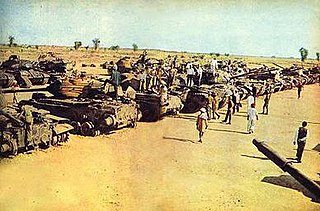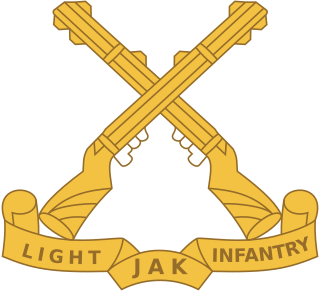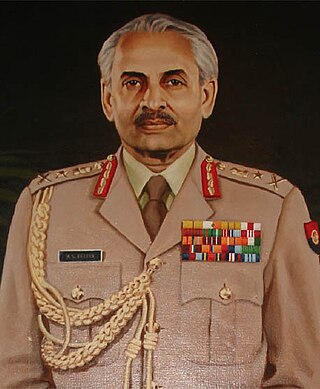Related Research Articles

The Kumaon Regiment is one of the oldest infantry regiments of the Indian Army. The regiment traces its origins to the 18th century and has fought in every major campaign of the British Indian Army and the Indian Army, including the two world wars, and is one of the highest decorated regiments of the Indian Army.

The Battle of Asal Uttar was one of the largest tank battles fought during the Indo-Pakistani War of 1965. It was fought from 8 to 10 September 1965, when the Pakistan Army thrust its tanks and infantry into Indian territory, capturing the Indian town of Khemkaran 5 km from the International Border. The Indian troops retaliated, and after three days of bitter fighting, the battle ended with the Pakistani forces being repulsed near Asal Uttar. Factors that contributed to this were the fierce fight put up by the Indian Army, conditions of the plains, better Indian tactics, and a successful Indian strategy.

The Madras Regiment is the oldest infantry regiment of the Indian Army, originating in the 1750s as a unit of the British East India Company. The regiment took part in numerous campaigns with the British Indian Army and the post-independence Indian Army.

The Jammu and Kashmir Light Infantry is an infantry regiment of the Indian Army. The regimental center is in Srinagar's Airport Complex at Awantipora with a winter setup near Jammu. Its regimental insignia consists of a pair of crossed rifles. The regiment mostly consists of volunteers from the state of Jammu & Kashmir and ethnic groups from the state. The Jammu and Kashmir Light Infantry is considered to be one of the most decorated regiment of the Indian army having won 1 Param Veer Chakra and 3 Ashok Chakra. Naib Subedar Chuni Lal of the 8th battalion Jammu and Kashmir Light Infantry is one of the most decorated personnel of the Indian Army.

General Arunkumar Shridhar VaidyaPVSM, MVC & Bar, AVSM, ADC was an Indian Army general. He served as the 13th Chief of the Army Staff from 1983 to 1986. Following his retirement, he was assassinated by Khalistani terrorists Harjinder Singh Jinda and Sukhdev Singh Sukha in August 1986, for his role in Operation Blue Star in 1983.
The Rajput Regiment is one of the oldest infantry regiments of the Indian Army, originating in 1778 with the raising of the 24th Regiment of Bengal Native Infantry. The 1st battalion of the regiment was formed in 1798.

The Garhwal Rifles, formerly known as the Royal Garhwal Rifles, are an infantry regiment of the Indian Army. It was originally raised in 1887 as the 39th (Garhwal) Regiment of the Bengal Army. It then became part of the British Indian Army, and after the Independence of India, it was incorporated into the Indian Army.

45 Cavalry is an armoured regiment in the Armoured Corps of the Indian Army. The regiment distinguished itself in operations during the 1971 Indo-Pakistan War winning one Maha Vir Chakra.
Subedar Major and Honorary Captain Yogendra Singh Yadav PVC is a retired Indian military officer, who was awarded India's highest military award, the Param Vir Chakra, for his actions during the Kargil War. He is the youngest recipient of the Param Vir Chakra to date, having received it at the age of 19.

Major Rajesh Singh Adhikari, MVC, was an Indian Army officer who died during the Kargil War. He was posthumously awarded the second highest Indian military honour, the Maha Vir Chakra for bravery on the battlefield.
The 15th Indian Division was an infantry division of the British Indian Army that saw active service in the First World War. It served in the Mesopotamian Campaign on the Euphrates Front throughout its existence. It did not serve in the Second World War, but was reformed at Dehradun in 1964 as part of the post-independence Indian Army.

Major Padmapani Acharya, MVC was an officer in the Indian Army. He was awarded the second highest Indian military honour, Maha Vir Chakra posthumously for his actions during the Kargil War on 28 June 1999.
Lieutenant General Khem Karan Singh, MVC was an Indian senior military officer. He was awarded the Padma Bhushan for his role in the 1971 Indo-Pakistani War. He also received the Maha Vir Chakra for his services during the Indo-Pakistani war of 1965.
20th Lancers is an armoured regiment in the Armoured Corps of the Indian Army. The regiment distinguished itself in operations with its defence of Chhamb in Jammu and Kashmir during the 1965 Indo-Pakistan War and won one Maha Vir Chakra. It has provided one Chief of Army Staff and two Army Commanders.
Brigadier Desmond Hayde MVC (1926–2013) was an officer in the Indian Army. He was the commanding officer of the 3rd battalion of the Jat Regiment in the Battle of Dograi during the Indo-Pakistani War of 1965. He led his battalion of 550 men and defeated an enemy force that was double the size of his own battalion. He was awarded the Maha Vir Chakra for his contribution in the war.

Brigadier Rattan Nath Sharma, MVC, was an officer in the Indian Army who served with the Punjab Regiment, and was awarded the Maha Vir Chakra, India's second-highest award for gallantry in the face of the enemy. The award was made for his actions during the Indo-Pakistani War of 1971, when he displayed exemplary courage and outstanding leadership while commanding the 21st Battalion, Punjab Regiment, in a successful assault on a fortified Pakistani position near the Poonch River in the Jammu and Kashmir sector of the Western Front. He retired from the army in 1977 as a brigadier, after which he was the chief managing director of the Indian Farmers Fertiliser Cooperative. He died in a vehicle accident in December 2011.

Brigadier Narinder Singh Sandhu MVC was an Indian Army officer who was awarded the Maha Vir Chakra (MVC), the second-highest Indian military decoration, for gallantry, leadership and devotion to duty during the Indo-Pakistan War of 1971. Sandhu was commissioned into the Indian Army Armoured Corps in 1953, and participated in the Battle of Asal Uttar during the Indo-Pakistani War of 1965, and was mentioned in dispatches. He transferred to the Dogra Regiment in 1970, and it was for his performance as commanding officer of the 10th Battalion, Dogra Regiment during an assault on a fortified Pakistan Army position that he was awarded the MVC. He retired as a brigadier and was active in veterans' and gallantry award recipients' matters until his death of colorectal cancer in 2018.

The Battle of Dograi was a military engagement from 20 to 22 September 1965, during the Indo-Pakistani War of 1965. It took place in the area of Dograi village on the outskirts of Lahore in Pakistani Punjab.
Brigadier Thomas Krishnan Theogaraj (1919-2001) was a senior officer in the Indian Army. Brigadier Theogaraj commanded the 2nd Independent Armored Brigade and played a key role during the Indo-Pakistan War of 1965. For his role in the war he was awarded the Maha Vir Chakra.
The Ahir Regiment, also known as the Yadav Regiment, is a proposed infantry regiment of the Indian Army that has been requested by the Yadava community.
References
- ↑ "1965: 'जिंदा या मुर्दा डोगरई में मिलना है' BBC Hindi". 20 September 2015.
- ↑ "जयंती पर मेजर आशाराम त्यागी को किया याद Dainik Jagran".
- ↑ "शहीद मेजर आशाराम त्यागी का 72 वीं जयंती मनाई Nawbharat Times".
- ↑ "1965: 'जिंदा या मुर्दा डोगरई में मिलना है'". BBC Hindi. 20 September 2015. Retrieved 13 October 2022.
- ↑ Sharma, Gautam (1990). Valour and Sacrifice: Famous Regiments of the Indian Army by Gautam Sharma. ISBN 9788170231400.
- ↑ "1965:'जिंदा या मुर्दा डोगरई में मिलना है'-BBC Hindi". 20 September 2015.
- ↑ "Indian Army, AWARDEES OF MAHA VIR CHAKRA".